Papers by Prof. Hasan AlMomani
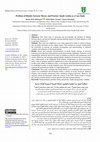
Dirasat: Human and Social Sciences
Objectives: This study aims at analyzing and investigating the problem of identity between theory... more Objectives: This study aims at analyzing and investigating the problem of identity between theory and practice through studying different aspects of Saudi identity as well as questions related to it. Methods: This study has employed a case study approach in order to analyze primary and secondary literature on this subject matter. This method of research would enable the researcher to provide an in-depth investigation and understanding of different variables and influences of the Saudi identity. Results: Social and economic transformations in Saudi Arabia, dictates, to diversify resources of revenue that could generate social and economic challenges. Therefore, social responsibility should be observed in order to establish an effective and institutional social system. Moreover, the emerging national identity should not be perceived as exclusionary and a replacement to the traditional Saudi identity. Furthermore, in relation to foreign policy, state sovereignty should be emphasized as...

دراسات: العلوم الانسانية و الاجتماعية, Jun 9, 2014
The aim of this book' review is to offer a critical analysis to the key assumptions and themes pr... more The aim of this book' review is to offer a critical analysis to the key assumptions and themes presented by the author where the positive contribution as well as points of contention have been highlighted. The key theme of this book focuses on notion that in the Middle East, unlike Europe, wars didn't make states but they destroyed them and they ended up as a hollow shell. This theme has been applied on different case studies in Arab World mainly Jordan, Iraq and UAE. The analytical review has discussed and analyzed author's arguments, methodology, systemization and demonstration, the theoretical and conceptual reflections on state and statehood as well as patterns of comparison between early modern European state and current Arab state. Eventually/ the review has concluded with offering alternative approaches in dealing with Arab states.
Choice Reviews Online, 2012
sdu.dk
... building of the Palestinian Authority. During the 1990s, the EU was the chief financial backe... more ... building of the Palestinian Authority. During the 1990s, the EU was the chief financial backer of the ... London: Frank Cass (2002). 28 Brach, Julianne. Ten Years After: Achievements and Challenges of the Euro-Mediterranean Economic and Financial Partnership. ...
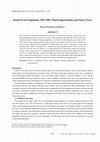
دراسات - العلوم الإنسانية والاجتماعية, 2020
This Study aims to analyses the Israeli-Syrian peace talks of 1991-1996 and why they failed to se... more This Study aims to analyses the Israeli-Syrian peace talks of 1991-1996 and why they failed to seize many enticing opportunities that were created in the course of their negotiation. This paper argues that the Israelis and Syrians had missed a number of enticing opportunities to solve their conflict during the peace talks of 1991-1996. Because of their rigged positions towards each other, deep distrust and lack of serious willingness to make necessary concessions and compromise. The Major bulk of this study is a discussion to these talks including parties' motive and Madrid peace conference and their negotiation between 1991 and 1996. To achieve this end, the study has employed a case study approach that would analyze primary and secondary literature on this subject matter so to comprehend different variables and dynamics that influenced these talks and led to its failure.This paper concludes that during these talks many enticing opportunities to solve he parties' conflict had emerged. However, Tel Aviv and Damascus had missed those many enticing opportunities and failed to hammer out a historical agreement that could have ended their long standing conflict.

تسعى الدراسة الحالية إلى التعريف بمظاهر التوظيف السياسي للخطاب الإعلامي في مقتل الصحفي جمال خاشقج... more تسعى الدراسة الحالية إلى التعريف بمظاهر التوظيف السياسي للخطاب الإعلامي في مقتل الصحفي جمال خاشقجي في محتوى المواقع الإخبارية لقناة الجزيرة ممثلة بموقعها الإخباري وجريدة الواشنطن بوست، ولتحقيق أهدافها وطفت منهج تحليل الخطاب؛ وذلك من أجل تحليل (20) مقال تم اختيارهم بشكل عشوائي منشورة في الموقع الإخباري لقناة الجزيرة وجريدة واشنطن بوست خلال فترات زمنية مختلفة تتراوح بين (تشرين الأول 2018 - شباط 2019)؛ حيث توصلت الدراسة إلى أن المواقع الإخبارية لقناة الجزيرة قد غيرت أسلوبها في نقل الخبر لأنها موجهة للجمهور العربي، كما غيرت جريدة واشنطن أسلوبها أيضا لأنها موجهة للعالم الغربي؛ حيث تحول موقفهما من الحيادية إلى توجيه الاتهامات الصريحة للمملكة العربية السعودية بمقتل خاشقجي، وفي ما يتعلق بالخطاب الإعلامي، فقد توصلت الدراسة إلى أن خطاب المواقع الإخبارية لقناة الجزيرة وجريدة واشنطن بوست قد احتويا على جميع عناصر الخطاب الإعلامي المؤثر في المتلقي ومنها الاتساق والانسجام وعنصر المقارنة والصور التشبهية والبلاغة. وعليه، فتوصي الدراسة بضرورة أن يكون هناك مواثيق وقوانين دولية تسهم في ضبط عمليات نقل ا...
This paper aims to understand the driving beliefs of those who join ISIS and unpick its unique na... more This paper aims to understand the driving beliefs of those who join ISIS and unpick its unique nature, answering what makes ISIS exceptional. The paper assess how ISIS survives in the face of territorial setbacks and investigates ISIS from outer and inner perspectives, employing case study approach through primary and secondary literature to provide insight into the main differences between al-Qaeda and ISIS. Further, the paper traces the history of other terrorist movements in relation to changing geopolitics, and explores ISIS’s profound relationship with millennials who in it find agency and instant gratification. Due to its ideological nature ,its radical belief and its virtual relationship with world-wide followers, ISIS maintains the possibility of surviving and reproducing itself in another form despite its setback and lacking territory,.

This study aims at analysing and investigating Saudi Arabia’s geopolitical interests in the Levan... more This study aims at analysing and investigating Saudi Arabia’s geopolitical interests in the Levant. The primary argument of this paper is that Riyadh’s national interests – particularly security, political and ideological – have been seriously challenged due to geopolitical developments, namely the Arab Spring and Iranian’s disruptive behaviour in the region. The major bulk of this study is a discussion to Saudi foreign policy as well as its geostrategic interests mainly in the Levant region. To achieve such end, this study has employed three levels of analysis approach to support the examination of primary and secondary literature on this subject in order to understand the different variables and dynamics of Saudi geopolitical interests in the Levant between 2011 and 2017. This paper concludes that Saudi Arabia has developed different vested interests in the region, however, the rise and expansion of ISIS (Daesh) and Tehran growing expansionism in the Middle East (mainly in Syria, ...
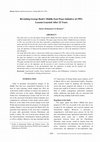
This study aims to revisit and analyze George Bush's Middle East Peace initiative of 1991 and... more This study aims to revisit and analyze George Bush's Middle East Peace initiative of 1991 and the lessons that could be learned after 22 years of its initiation. This paper argues that since Bush’s Middle East peace initiative of 1991 was successful in the sense that it generated a comprehensive peace process between concerned Arab parties and Israel for the first time, many lessons would be learned. Chief among them is the importance and the necessity of active American involvement, the importance of inclusiveness, significance of the pre-negotiation stage, the importance of timing and the regional and international context as well as the importance of motives and willingness. The major bulk of this study is a discussion to Bush's peace proposal of 1991, motives of the concerned parties to accept such initiative as well as key conditions behind the success of this peace initiative. To achieve such end this paper has employed a case study approach that would analyze primary ...
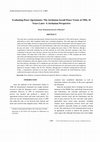
This study aims at assessing and analyzing the Jordanian-Israeli peace agreement of 1994, and the... more This study aims at assessing and analyzing the Jordanian-Israeli peace agreement of 1994, and the parties’ subsequent relationship as well as their compliance mainly from a Jordanian perspective. This study argues that although both parties have been highly motivated to forge peaceful and functional relations, developments within the regional context of the Arab-Israeli conflict particularly the Israeli-Palestinian conflict have been playing a detrimental role in shaping the pace and nature of the Jordanian-Israeli ties since signing their peace treaty in 1994. Moreover, although a comprehensive Arab-Israeli settlement has not been achieved yet, both Jordan and Israel continued to show their commitment to the peace treaty and that a mixture of up and downs has been characterising the order of Jordanian-Israeli relations. The major bulk of this study is a discussion to the peace treaty of 1994, Jordanian and Israeli motivations and subsequent relations in between as well as their com...
Jordan Journal of Social Sciences, Jan 14, 2013
Jordan Journal of Social Sciences, Jan 14, 2013
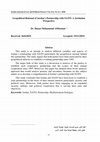
Jordan Journal of Law and Political Sciences, 2020
Abstrac This study is an attempt to analyze different variables and aspects of Jordan's relations... more Abstrac This study is an attempt to analyze different variables and aspects of Jordan's relationship with NATO particularly the geopolitical rational behind this partnership. The study argues that both parties have been motivated by their geopolitical interests to establish a working partnership since 1995. The major bulk of this study is a discussion to motives of the parties to establish such cooperative partnership and the scopes of their mutual cooperation since 1995. Moreover, this paper has adopted three levels analyses approach that would analyze primary and secondary literature on this subject matter so to develop a comprehension of Jordan's partnership with NATO. This study concludes that Jordan and NATO have been keen to establish a joint partnership on the bases of their mutual interests particularly security and political ones. Moreover, both parties have been engaging in an expanded security, military and political cooperation that is serving their aims and objectives.
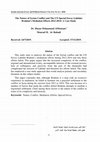
Jordan Journal of Law and Political Sciences, 2020
Abstrac This study aims to analyses the nature of the Syrian conflict and the UN Envoy Lakhdar Br... more Abstrac This study aims to analyses the nature of the Syrian conflict and the UN Envoy Lakhdar Brahimi's mediations efforts during 2012-2014 and why these efforts failed. This paper argues that the increased complexity of the conflict, regional and international rivalry, incompatible interests of the external powers, lack of willingness and passivity from the part of the disputants had complicated the mission of Lakhdar and therefore his efforts failed. The study has employed a case study approach that would analyze primary and secondary literature on this subject matter. This paper concludes that, although Brahimi is a man with an extensive experience in mediation, he failed to hammer out a peaceful settlement to the conflict in Syria during his mission from 2012 to 2014. This was because of a number of factors that made the conflict defied Brahimi attempts to mediate a negotiated settlement. Chief among these factors is the nature of the conflict in terms of its complexity and intensity.

Dirasat, Human and Social Sciences 47,. 1,, 2020
This Study aims to analyses the Israeli-Syrian peace talks of 1991-1996 and why they failed to se... more This Study aims to analyses the Israeli-Syrian peace talks of 1991-1996 and why they failed to seize many enticing opportunities that were created in the course of their negotiation. This paper argues that the Israelis and Syrians had missed a number of enticing opportunities to solve their conflict during the peace talks of 1991-1996. Because of their rigged positions towards each other, deep distrust and lack of serious willingness to make necessary concessions and compromise. The Major bulk of this study is a discussion to these talks including parties' motive and Madrid peace conference and their negotiation between 1991 and 1996. To achieve this end, the study has employed a case study approach that would analyze primary and secondary literature on this subject matter so to comprehend different variables and dynamics that influenced these talks and led to its failure.This paper concludes that during these talks many enticing opportunities to solve he parties' conflict had emerged. However, Tel Aviv and Damascus had missed those many enticing opportunities and failed to hammer out a historical agreement that could have ended their long standing conflict.
Dirasat, Human and Social Science, 2019
This paper aims to understand the driving beliefs of those who join ISIS and unpick its unique na... more This paper aims to understand the driving beliefs of those who join ISIS and unpick its unique nature, answering what makes ISIS exceptional. The paper assess how ISIS survives in the face of territorial setbacks and investigates ISIS from outer and inner perspectives, employing case study approach through primary and secondary literature to provide insight into the main differences between al-Qaeda and ISIS. Further, the paper traces the history of other terrorist movements in relation to changing geopolitics, and explores ISIS's profound relationship with millennials who in it find agency and instant gratification. Due to its ideological nature, its radical belief and its virtual relationship with worldwide followers, ISIS maintains the possibility of surviving and reproducing itself in another form despite its setback and lacking territory.
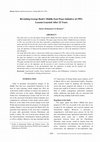
This study aims to revisit and analyze George Bush's Middle East Peace initiative of 1991 and the... more This study aims to revisit and analyze George Bush's Middle East Peace initiative of 1991 and the lessons that could be learned after 22 years of its initiation. This paper argues that since Bush's Middle East peace initiative of 1991 was successful in the sense that it generated a comprehensive peace process between concerned Arab parties and Israel for the first time, many lessons would be learned. Chief among them is the importance and the necessity of active American involvement, the importance of inclusiveness, significance of the pre-negotiation stage, the importance of timing and the regional and international context as well as the importance of motives and willingness. The major bulk of this study is a discussion to Bush's peace proposal of 1991, motives of the concerned parties to accept such initiative as well as key conditions behind the success of this peace initiative. To achieve such end this paper has employed a case study approach that would analyze primary and secondary literature on this subject matter so to understand different variables and dynamics that influenced this initiative. This paper concludes that since Bush's Middle East peace initiative of 1991 was successful, many lessons would be learned such as: the importance and the necessity of active American involvement, the importance of inclusiveness, significance of the pre-negotiation stage, the importance of timing and the regional and international context as well as the importance of motives and willingness.
The aim of this book' review is to offer a critical analysis to the key assumptions and themes pr... more The aim of this book' review is to offer a critical analysis to the key assumptions and themes presented by the author where the positive contribution as well as points of contention have been highlighted. The key theme of this book focuses on notion that in the Middle East, unlike Europe, wars didn't make states but they destroyed them and they ended up as a hollow shell. This theme has been applied on different case studies in Arab World mainly Jordan, Iraq and UAE. The analytical review has discussed and analyzed author's arguments, methodology, systemization and demonstration, the theoretical and conceptual reflections on state and statehood as well as patterns of comparison between early modern European state and current Arab state. Eventually/ the review has concluded with offering alternative approaches in dealing with Arab states.

This study aims at analysing and investigating Saudi Arabia's geopolitical interests in the Levan... more This study aims at analysing and investigating Saudi Arabia's geopolitical interests in the Levant. The primary argument of this paper is that Riyadh's national interests-particularly security, political and ideological-have been seriously challenged due to geopolitical developments, namely the Arab Spring and Iranian's disruptive behaviour in the region. The major bulk of this study is a discussion to Saudi foreign policy as well as its geostrategic interests mainly in the Levant region. To achieve such end, this study has employed three levels of analysis approach to support the examination of primary and secondary literature on this subject in order to understand the different variables and dynamics of Saudi geopolitical interests in the Levant between 2011 and 2017. This paper concludes that Saudi Arabia has developed different vested interests in the region, however, the rise and expansion of ISIS (Daesh) and Tehran growing expansionism in the Middle East (mainly in Syria, Lebanon and in Gaza) has posed direct threats against Saudi national interests.
This paper aims to understand the driving beliefs of those who join ISIS and unpick its unique na... more This paper aims to understand the driving beliefs of those who join ISIS and unpick its unique nature, answering what makes ISIS exceptional. The paper assess how ISIS survives in the face of territorial setbacks and investigates ISIS from outer and inner perspectives, employing case study approach through primary and secondary literature to provide insight into the main differences between al-Qaeda and ISIS. Further, the paper traces the history of other terrorist movements in relation to changing geopolitics, and explores ISIS's profound relationship with millennials who in it find agency and instant gratification. Due to its ideological nature, its radical belief and its virtual relationship with worldwide followers, ISIS maintains the possibility of surviving and reproducing itself in another form despite its setback and lacking territory.











Uploads
Papers by Prof. Hasan AlMomani
The European Union (EU) is emerging as a major actor in regional and global
peacebuilding. It represents, in aggregated terms, one of the world’s largest donors,
contributing both to development and conflict resolution. In historical terms the
EU has been conceived as a peace project. The strong self-image of the EU is
articulated in the “discourse of universal ethics which defines the EU as a ‘power
for good’ and a ‘peacebuilder’ on the international scene” (Aggestam 2008: 1). In
European terms the EU’s historical achievement of building peace among its
member states is unsurpassed in its social, economic and political potential. It has also
been deemed successful in exporting the values and norms that guide the EU’s
internal relations and structuring the new democracies of Eastern Europe through
political conditionality, with either membership or close trade and cooperation
agreements as incentives (see Carlsaes et al. 2004; Tonra and Christiansen 2004).
This potential of EU’s transformative influence extends also to the Western Balkans,
where the dynamics of peacebuilding is connected to the enlargement process
emphasized by the attraction of membership. Outside the Union’s geographical
sphere of influence, where the integrationist logic does not apply, and where EU
accession is not an opportunity, the peacebuilding approach of the EU has less
impact. This is clearly visible in the Israeli–Palestinian conflict, as Anders Persson
underlines in this volume, as well as in the analysis by Momani and Rennick of
EU regional peacebuilding strategies.
The EU framework for peacebuilding is, to a large extent, based on the liberal
peace model. This framework is, as pointed out by Björkdahl et al. (2009), based
on the sum of the EU’s uncoordinated constituent parts, which include aspirations
for normative power, the individual interest of the different member states as well
as their collective interests, and the Union’s specific historical character in political,
economic and social terms. Yet the EU seems to aspire to a more sophisticated
and locally relevant form of peacebuilding than the one that developed from the
Washington consensus. As several scholars have concluded, the EU is not just
concerned with putting an end to a specific conflict or addressing the symptoms of
conflict, but aims to eradicate the root causes of conflict, whether social, political or
economic, and to transform conflict into a sustainable peace (Manners 2002; Juncos
2005; Tocci 2008). Hence it can be assumed that the evolving EU peacebuilding
framework seems to have the potential, as Oliver Richmond argues in his chapter, to
move beyond the critiques of liberal peacebuilding towards a transformative
approach to peacebuilding that is less state-centric and more inclusive.
A regional approach has emerged as a cornerstone of the EU’s peacebuilding
approach in both the Western Balkans and the Middle East. This is linked to the
European Union’s own experience of regional integration and a firm belief in
14 Karin Aggestam and Annika Björkdahl
regional integration and interdependencies as a key to durable peace. With
this approach, the EU established a coordinated set of political and economic
conditionalities aimed at infrastructure reconstruction and institution-building.
Promoting civil society from the grassroots has emerged as a second cornerstone
of the EU peacebuilding framework, as a strategy to counterbalance elite power,
to enhance accountability of the elite by the society, and to circumvent political
stagnation. Liberal peacebuilding relies on a notion of civil society that is “relatively
free from ethno-nationalism and generally oriented towards the norms and values
of the peacebuilding and statebuilding project” (Belloni 2001; Kappler and
Richmond 2011).
Despite the fact that the EU itself is a post-modern polity that transcends
territorial sovereignty and has ambitions to change traditional notions of national
sovereignty, its peacebuilding remains to a large extent state-centric. When
engaging with the local context, the EU does so through the state, and it prefers
governments or powerful elites as interlocutors on the state level. Hence the success
of EU peacebuilding becomes dependent on the functioning of the government
and state institutions (Kappler and Richmond 2011). This state-centrism obviously
challenges, and to some extent contradicts, the two other cornerstones of the EU
peacebuilding framework – the regionalist approach and the civil society approach.
In sum, the variety and richness of the conceptual and empirical chapters
included in this volume together constitute an original contribution to the growing
literature on peacebuilding in conflict-ridden societies through its focus on justice
and the quality of the peace. It also represents a significant addition to the
growing research field on transitional justice by advancing synergies and complementarities
between transitional justice and peacebuilding processes. Finally, it
contains policy-relevant knowledge about effective peacebuilding strategies and
in-depth empirical assessments of the contemporary peace processes in the
Middle East and Western Balkans. As editors, we hope that this will provide you
as a reader with a comprehensive understanding of the complex notion of just
peace, as well as compelling you to further probe its problematique.
Notes